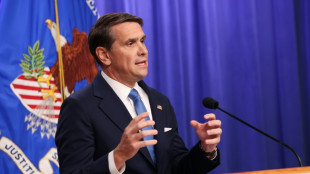-
 Mertens and Zhang win Australian Open women's doubles title
Mertens and Zhang win Australian Open women's doubles title
-
Venezuelan interim president announces mass amnesty push

-
 China factory activity loses steam in January
China factory activity loses steam in January
-
Melania Trump's atypical, divisive doc opens in theatres

-
 Bad Bunny set for historic one-two punch at Grammys, Super Bowl
Bad Bunny set for historic one-two punch at Grammys, Super Bowl
-
Five things to watch for on Grammys night Sunday

-
 Venezuelan interim president proposes mass amnesty law
Venezuelan interim president proposes mass amnesty law
-
Rose stretches lead at Torrey Pines as Koepka makes cut

-
 Online foes Trump, Petro set for White House face-to-face
Online foes Trump, Petro set for White House face-to-face
-
Seattle Seahawks deny plans for post-Super Bowl sale

-
 US Senate passes deal expected to shorten shutdown
US Senate passes deal expected to shorten shutdown
-
'Misrepresent reality': AI-altered shooting image surfaces in US Senate

-
 Thousands rally in Minneapolis as immigration anger boils
Thousands rally in Minneapolis as immigration anger boils
-
US judge blocks death penalty for alleged health CEO killer Mangione

-
 Lens win to reclaim top spot in Ligue 1 from PSG
Lens win to reclaim top spot in Ligue 1 from PSG
-
Gold, silver prices tumble as investors soothed by Trump Fed pick

-
 Ko, Woad share lead at LPGA season opener
Ko, Woad share lead at LPGA season opener
-
US Senate votes on funding deal - but shutdown still imminent

-
 US charges prominent journalist after Minneapolis protest coverage
US charges prominent journalist after Minneapolis protest coverage
-
Trump expects Iran to seek deal to avoid US strikes

-
 US Justice Dept releases documents, images, videos from Epstein files
US Justice Dept releases documents, images, videos from Epstein files
-
Guterres warns UN risks 'imminent financial collapse'

-
 NASA delays Moon mission over frigid weather
NASA delays Moon mission over frigid weather
-
First competitors settle into Milan's Olympic village

-
 Fela Kuti: first African to get Grammys Lifetime Achievement Award
Fela Kuti: first African to get Grammys Lifetime Achievement Award
-
Cubans queue for fuel as Trump issues oil ultimatum

-
 'Schitt's Creek' star Catherine O'Hara dead at 71
'Schitt's Creek' star Catherine O'Hara dead at 71
-
Curran hat-trick seals 11 run DLS win for England over Sri Lanka

-
 Cubans queue for fuel as Trump issues energy ultimatum
Cubans queue for fuel as Trump issues energy ultimatum
-
France rescues over 6,000 UK-bound Channel migrants in 2025

-
 Surprise appointment Riera named Frankfurt coach
Surprise appointment Riera named Frankfurt coach
-
Maersk to take over Panama Canal port operations from HK firm

-
 US arrests prominent journalist after Minneapolis protest coverage
US arrests prominent journalist after Minneapolis protest coverage
-
Analysts say Kevin Warsh a safe choice for US Fed chair

-
 Trump predicts Iran will seek deal to avoid US strikes
Trump predicts Iran will seek deal to avoid US strikes
-
US oil giants say it's early days on potential Venezuela boom

-
 Fela Kuti to be first African to get Grammys Lifetime Achievement Award
Fela Kuti to be first African to get Grammys Lifetime Achievement Award
-
Trump says Iran wants deal, US 'armada' larger than in Venezuela raid

-
 US Justice Dept releases new batch of documents, images, videos from Epstein files
US Justice Dept releases new batch of documents, images, videos from Epstein files
-
Four memorable showdowns between Alcaraz and Djokovic

-
 Russian figure skating prodigy Valieva set for comeback -- but not at Olympics
Russian figure skating prodigy Valieva set for comeback -- but not at Olympics
-
Barcelona midfielder Lopez agrees contract extension

-
 Djokovic says 'keep writing me off' after beating Sinner in late-nighter
Djokovic says 'keep writing me off' after beating Sinner in late-nighter
-
US Justice Dept releasing new batch of Epstein files

-
 South Africa and Israel expel envoys in deepening feud
South Africa and Israel expel envoys in deepening feud
-
French eyewear maker in spotlight after presidential showing

-
 Olympic dream 'not over', Vonn says after crash
Olympic dream 'not over', Vonn says after crash
-
Brazil's Lula discharged after cataract surgery

-
 US Senate races to limit shutdown fallout as Trump-backed deal stalls
US Senate races to limit shutdown fallout as Trump-backed deal stalls
-
'He probably would've survived': Iran targeting hospitals in crackdown

Germany doesn't want any more migrants?
Germany, once a beacon of openness during the 2015 migrant crisis when it welcomed over a million refugees, appears to be undergoing a profound shift in its stance on immigration. Under the leadership of Friedrich Merz, the newly elected chancellor from the Christian Democratic Union (CDU), the country is tightening its borders and rethinking its reliance on foreign labour. This pivot, driven by economic pressures, security concerns, and a resurgent far-right, raises questions about the future of a nation long defined by its post-war commitment to multiculturalism and economic pragmatism.
A Legacy of Openness Under Strain:
Germany’s immigration policy has historically been shaped by necessity and morality. After World War II, the "Wirtschaftswunder—the economic miracle—relied" on "Gastarbeiter" (guest workers) from Turkey and southern Europe to rebuild the nation. In 2015, Chancellor Angela Merkel’s decision to open borders to Syrian and other refugees was both a humanitarian gesture and a bid to bolster an ageing workforce. By 2020, immigrants and their descendants comprised 26% of Germany’s 83 million residents, per the Federal Statistical Office, contributing significantly to sectors like manufacturing and healthcare.
Yet, the mood has soured. The CDU’s victory in the 23 February 2025 federal election, securing 28.5% of the vote, came amid a surge for the anti-immigrant Alternative für Deutschland (AfD), which captured 20%. Merz, forming a coalition with the Social Democratic Party (SPD), has vowed to address what he calls “uncontrolled inflows,” signalling a departure from Merkel’s legacy.
Economic Pragmatism Meets Saturation:
Germany’s economy, Europe’s largest, has long depended on immigrants to fill labour gaps. In 2024, the Institute for Employment Research (IAB) estimated a shortage of 400,000 skilled workers, particularly in engineering and nursing. The birth rate, at 1.5 children per woman, remains well below replacement level, amplifying the need for foreign talent. So why the reversal?
Uneducated immigrants are a burden on the German welfare system:
Analysts point to a saturation point. Unemployment, though low at 5.5% in 2024, masks regional disparities and a growing perception that immigrants strain welfare systems. The influx of 200,000 Ukrainian refugees since 2022, while largely welcomed, has stretched housing and social services, with cities like Berlin reporting a 20% rise in rents over two years. Merz has argued that Germany must “prioritise integration over importation,” citing a 2024 Interior Ministry report that 30% of recent arrivals remain jobless after five years—a statistic seized upon by critics of open borders.
Security and the Far-Right Shadow - Too many Migaten are simply criminal:
Security concerns have further fuelled the shift. High-profile incidents, such as the December 2024 knife attack in Mannheim by an Afghan asylum seeker, which left three dead, have reignited debates about vetting and deportation. The AfD, capitalising on such events, has pushed a narrative of “immigrant crime,” despite data showing that foreign nationals’ offence rates (excluding immigration violations) align with those of native Germans. Merz, while distancing himself from the AfD’s rhetoric, has pledged tougher asylum rules and faster removals of rejected applicants, a nod to public unease.
The far-right’s electoral gains—126 projected Bundestag seats—have pressured mainstream parties to act. Posts on X reflect a polarised populace: some decry “a betrayal of German values,” while others cheer “a return to sovereignty.” Merz’s coalition, balancing the SPD’s pro-immigration leanings, must navigate this divide.
Policy Shifts and Global Implications:
Concrete measures are emerging. In February 2025, Merz announced plans to cap asylum applications at 100,000 annually—down from 300,000 in 2023—and expand “safe third country” agreements, allowing deportations to nations like Turkey. The Skilled Immigration Act, liberalised in 2023 to attract professionals, faces scrutiny, with proposals to raise income thresholds and tighten language requirements. Meanwhile, the EU’s New Pact on Migration, which Germany endorsed in 2024, is under review as Berlin seeks stricter external border controls.
Globally, this retrenchment could dim Germany’s image as a progressive leader. Its ageing population—projected to shrink to 79 million by 2050 without immigration—poses a long-term economic risk. The Confederation of German Employers (BDA) warned in January 2025 that curtailing inflows could cost 1% of GDP growth annually by 2030. Yet, political expediency seems to trump such forecasts for now.
A Nation at a Crossroads:
Germany’s turn from immigration reflects a confluence of pressures: economic limits, security fears, and a populist tide. It does not signal an absolute rejection—labour shortages ensure some openness persists—but a recalibration towards control and selectivity. For Merz, the challenge is twofold: assuaging a restive electorate while preserving the economic engine that immigrants have long fuelled. Whether this balancing act succeeds will shape not just Germany’s future, but Europe’s.

Iraq vs. Iran – The end?

France's debt is growing

Azerbaijan defies Russia

Geopolitics: Peru's balancing act

Spain defies NATO's 5% goal

Israel's Covert Nuclear Rise

Iran's Nuclear Ambitions

Germany's Anti-Woke Tide

Demographic Collapse Crisis

Israel's War on Iran's Ayatollahs

Israel-Iran: USA Strikes




